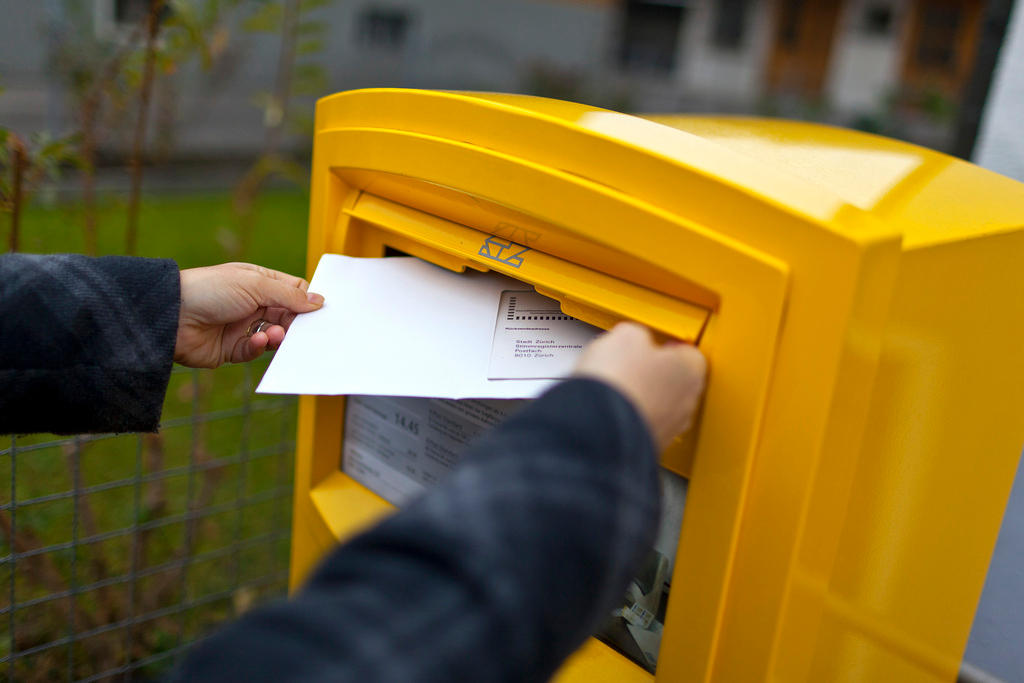
Stamps make a difference for voter turnout

A study confirms what might be expected: that postage-paid envelopes help boost the number of mail-in ballots in Swiss votes. More surprising is perhaps the finding that the political left does not benefit from the publicly funded ballot procedure.
Two scientists at Fribourg University, Mark SchelkerExternal link and Marco Schneiter, conducted a studyExternal link showing the impact of pre-paid envelopes, which Swiss citizens use to send in their ballot papers in nationwide votes.
The researchers examined turnout in municipalities between 1989 to 2014, comparing those that provide their citizens with pre-paid return envelopes with those where voters cover the cost of a stamp themselves.
The price for the cheapest stamp ranged between CHF0.5 ($0.5) and CHF0.85 over the 30-year period.
“We find that paying the postage is associated with a statistically significant 1.8 percentage points increase in voter turnout,” the economists conclude.
In concrete terms, voter participation was 4.5% above average in municipalities that offered pre-paid return envelopes.
The survey was conducted in 325 municipalities of canton Bern, accounting for about 8% of all the Swiss communes spread over the country’s 26 cantons.
Political impact
The findings have helped Swiss People’s Party parliamentarian Yvette Estermann justify her renewed call on the government to ensure a streamlined voting procedure in all Swiss municipalities. In September, Estermann filed a motionExternal link demanding that the estimated CHF1 million in postage for nationwide votes and elections be paid with public money.
“Many Swiss would like to see a higher turnout in nationwide elections and votes,” she says. “It is time to act for the government, and to pay the costs for the return envelopes via the state-run national Swiss Post.”
A similar attempt by Estermann four years ago failed to win enough backing in parliament.
The scientists also studied the impact of paid postage on voter support for left-leaning politics.
They noted that support for issues promoted by the Social Democratic Party and the Green Party win slightly less approval in municipalities with pre-paid ballot service.
“This might suggest that voters, mobilised by the paid postage, tend to have more conservative positions than the leftist parties,” they say.
“This increase in turnout negatively affects the alignment of voters with leftist party positions.”
Postal vote and e-vote
Under current legislation, local authorities are free to provide stamped return envelopes or not, depending on regulations at the cantonal level.
The right to vote by post was implemented at a nationwide level in Switzerland in 1994, although some cantons launched the procedure decades before.
Selected groups of Swiss citizens, notably those living abroad, have also been able to participate in votes and elections using computers. Trials with e-voting have been underway for more than 12 years.
The government wants to allow most cantons to offer online voting as an option in the next parliamentary elections in 2019, as part of the official e-government strategyExternal link.

In compliance with the JTI standards
More: SWI swissinfo.ch certified by the Journalism Trust Initiative
















![The four-metre-long painting "Sonntag der Bergbauern" [Sunday of the Mountain Farmers, 1923-24/26] had to be removed by a crane from the German Chancellery in Berlin for the exhibition in Bern.](https://www.swissinfo.ch/content/wp-content/uploads/sites/13/2025/12/01_Pressebild_KirchnerxKirchner.jpg?ver=bb19e376)














You can find an overview of ongoing debates with our journalists here . Please join us!
If you want to start a conversation about a topic raised in this article or want to report factual errors, email us at english@swissinfo.ch.